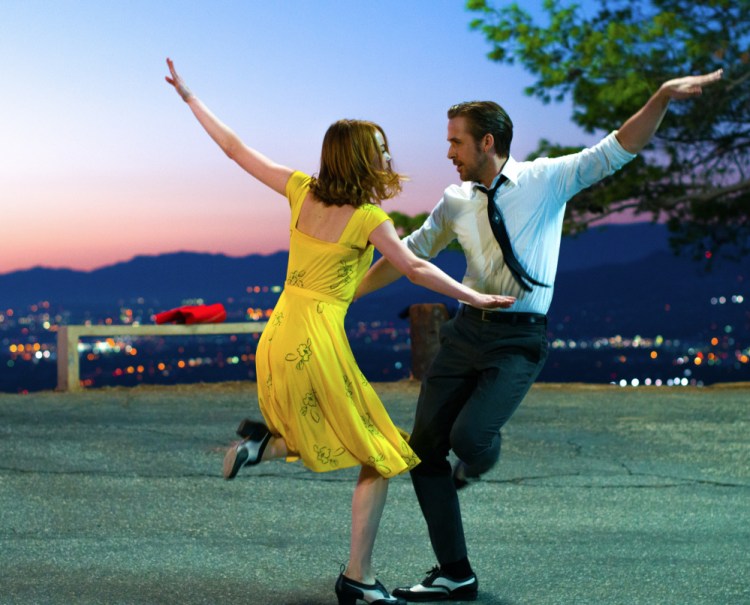Film music is only a little more than 100 years old, but that’s long enough for any art form to grow stale. Musically, most trips to the multiplex run together these days, with delights and surprises in short supply. But if this year’s Academy Award nominees for best score are any indication, new blood is beginning to course.
Justin Hurwitz, who won the Oscar, is only 32 – and “La La Land” was his third score for a feature film. Mica Levi, 30, was nominated for her second feature, “Jackie.” “Moonlight” composer Nicholas Britell, 36, scored his first major film in 2015.
But it’s not just the relative youth and wetness-behind-the-ears that are noteworthy. These composers, and several others, are shaking up the sound of Hollywood. Film scores are starting to have personality again.
Levi’s score for “Jackie,” with its in-your-face string slides and jarring, queasy waltzes, was somewhat divisive, but that’s because people took notice. The London native is classically trained, but until recently was best known as “Micachu,” creator of experimental pop music. She brought her unique background to Chilean director Pablo Larraín’s outsider take on the grieving first lady.
Larraín was a juror at the Venice Film Festival in 2013 when Levi made her film scoring debut, for Jonathan Glazer’s “Under the Skin,” an itching, churning aural nightmare for Scarlett Johansson’s seductive alien.
Larraín “pushed the jury committee for an award for Mica, and she got it, because I felt that I was listening to something that was immediately made from a master,” he said last year. “I just thought that it was really something that I had never heard before – and nowadays, that’s something very, very, very hard.”
While the director was editing “Jackie,” Levi sent him short pieces – music of trauma, of abstraction, and music she just thought Jacqueline Kennedy “might have liked” – and he inserted them in unexpected places, often loudly, to create an overall feeling of disorientation. Film music is often disparaged as emotional wallpaper, but Levi’s scores are main characters.
This new wave of composers is emerging partly thanks to young filmmakers entering the field, often looking to their peers for easy collegiality – as opposed to when a previous generation, led by Steven Spielberg and Martin Scorsese, began making films, and looked to John Williams and Bernard Herrmann for veteran voices.
Hurwitz and director Damien Chazelle went to Harvard, where they played in a band together. That dorm room rapport contributed to their first collaboration, the indie musical “Guy and Madeline on a Park Bench,” and organically led to their work on “Whiplash” and “La La Land.” Music has played an important role in all of their projects, and Hurwitz’s scores have sounded ironically novel by showcasing vintage styles such as jazz and old Hollywood musicals.
Nicholas Britell was a producer on the “Whiplash” short that preceded Chazelle’s feature, and he even worked on an early “La La Land” song that didn’t make the cut. The Manhattan-born composer studied to be a concert pianist but instead went to Harvard to study psychology. There, he joined a hip-hop band and made beats on a daily basis.
Film music has often erred into a thick orchestral mayonnaise, but Britell favors intimacy and tactility – just right for Barry Jenkins’ Oscar-winning “Moonlight.” The composer wrote a fragile violin poem (recorded with a closely miked bow) for the young protagonist, which grew deeper in sound as the character grows older. He applied the southern hip-hop tactic of “chopped and screwed” to slow the music down.
“It was a beautiful thing,” Jenkins said. “I was speaking in a language, and Nick was speaking in another language, but we were saying the same thing quite often. The journey that we took together was invigorating for both of us, because there was always this thing where I’m teaching Nick about chopped and screwed, and he’s teaching me about tremolos and counterpoint.”
All of the above films fall into “indie” or “prestige” genres, and the blockbuster category is still dominated by Hollywood’s old guard. Hans Zimmer, 59, just scored “Dunkirk” for regular collaborator Christopher Nolan. Danny Elfman, 64, is working on the score for “Justice League.” Alan Silvestri, 67, has Steven Spielberg’s “Ready Player One” and “Avengers: Infinity War” on his plate. The venerable John Williams, 85, is working on the next “Star Wars.”
The Zimmer sound – big, bombastic and groove-based – became the model, partly because of its contemporary cool and also because of the commercial, risk-averse nature of the modern Hollywood machine. As Zimmer continued to evolve his sound with scores such as “The Thin Red Line” and “Interstellar,” he left an ocean full of pale imitations and sameness in his wake.
Which makes the recent influx of individualistic, and sometimes radical, newcomers so welcome.
Tentpole films might continue to be propped up by old, familiar stakes, but the rest of cinema – not to mention ambitious series on cable and streaming services – is beginning to stir with new life.
Send questions/comments to the editors.



Success. Please wait for the page to reload. If the page does not reload within 5 seconds, please refresh the page.
Enter your email and password to access comments.
Hi, to comment on stories you must . This profile is in addition to your subscription and website login.
Already have a commenting profile? .
Invalid username/password.
Please check your email to confirm and complete your registration.
Only subscribers are eligible to post comments. Please subscribe or login first for digital access. Here’s why.
Use the form below to reset your password. When you've submitted your account email, we will send an email with a reset code.